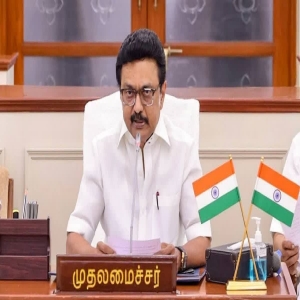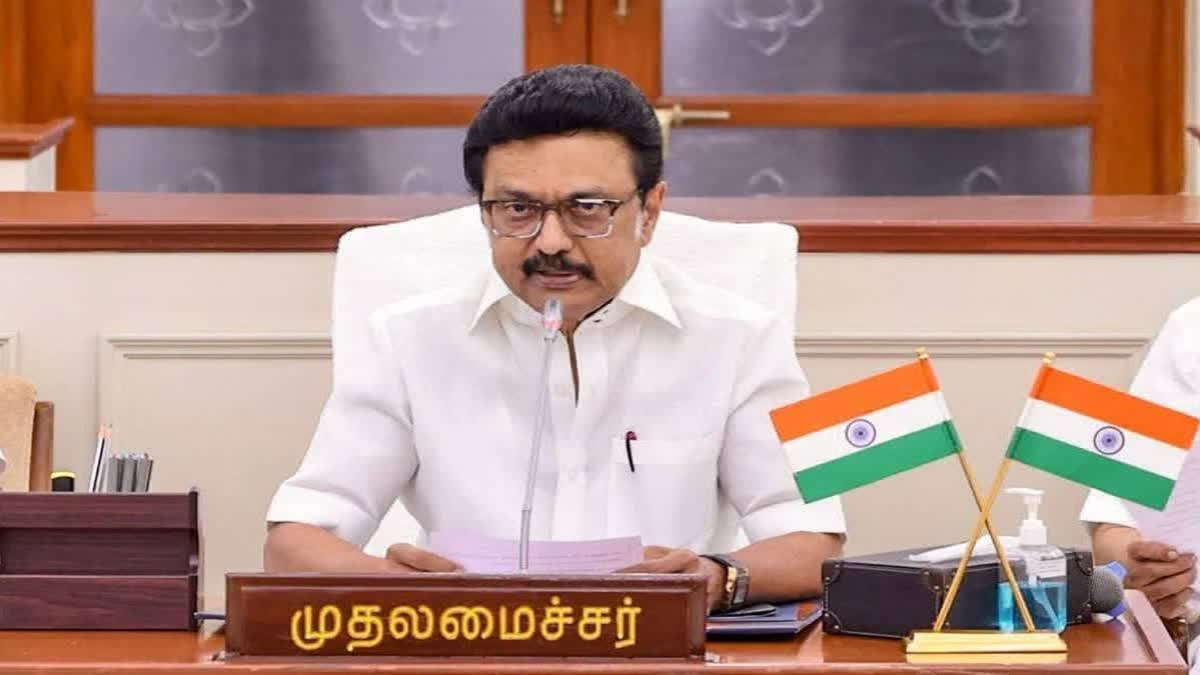

The 14 questions that President Droupadi Murmu has referred to the Supreme Court will decide whether India is a democracy or an autocracy disguised as a democracy. This is because the executive (which is a synonym for the government headed by the President) has been repeatedly attacking the judiciary.
Tamil Nadu chief minister, MK Stalin, has shot off a missive to the chief ministers of eight non-BJP ruled states asking them to form a unified legal front in the Supreme Court to battle the onslaught of the BJP. He has alleged the ruling party has been using governors as "political obstructions in non-BJP states by delaying governance and as parallel centres of power."
Stalin has alleged that the governors (whose names have been proposed by the ruling party) have abused their position as chancellors of universities and in other spheres. The time has come to stop the rot, which is why he has called for a united legal fight of the eight non-BJP-ruled states in the Supreme Court to assist the Supreme Court in answering this Presidential reference.
"If the Supreme Court judgment pronounced on April 8 is diluted, it will have serious repercussions for federalism," the Tamil Nadu chief minister has claimed. Like the governors, the President is supposed to uphold the Constitution by being non-political. As the first citizen of India, she has to uphold the Constitution and not succumb to the diktats of political parties with divisive ideologies.
In the past, the government has attacked the judiciary through Vice President Jagdeep Dhankhar and the former law minister Kiren Rijiju, alleging that the judges keep crossing their boundaries to usurp the duties of the executive and the legislature, which are accountable to the people every five years.
Dhankar, a senior advocate of the Supreme Court, has also claimed in the past that the judiciary had overstepped its laxman rekha by formulating the basic structure doctrine, which declares that Parliament can never tamper with certain inalienable human rights in the Constitution, such as the independence of the judiciary or the right to life.
The judiciary alleges these Constitutional dignitaries are selected in secrecy and not openly elected. Secret selections culminate in spectacles like the allegedly corrupt judge, Yashwant Varma, refusing to resign after crores of 500-rupee notes were found in the outhouse attached to his official residence in Delhi.
The 52nd CJI, Bhushan Ramakrishna Gavai, also deprecated the Supreme Court Bar Association and the Supreme Court Advocates-on-Record Association's (SCAORA) refusal to hold their traditional function for Justice Bela Trivedi on her demitting office. He clarified that the Constitution was supreme in India, and the executive, legislature, and judiciary had to work in tandem for the people as they were not isolated compartments.
Justice Bela Trivedi was elevated to the Gujarat High Court after she served as the state law secretary when Prime Minister Narendra Modi was the chief minister of Gujarat. CJI Gavai expressed his ire that the Maharashtra chief secretary, Sujata Saunik, and the DGP, Rashmi Shukla, ignored protocol by not being present to receive him at the Mumbai airport when he returned to his home state as the CJI, the nation's top judicial post.
One can only speculate whether this was a deliberate affront to the nation's top judge to convey the message that the judiciary must yield to the diktats of the executive branch.
But to return to the issue at hand, President Droupadi Murmu referred the 14 questions to the Supreme Court on May 13, the last working day of the 51st CJI, Sanjiv Khanna. The reference was made soon after a Supreme Court division bench of Justices JB Pardiwala and R Mahadevan unanimously held that Tamil Nadu Governor RN Ravi's withholding of 10 state legislative bills was "illegal" and "erroneous."
The Bench used its discretionary powers under Article 142 to hold the bills pending assent and reserved for the President were deemed to have been assented. This appears to be the trigger for President Droupadi Murmu to make the Presidential reference for the 14 questions.
The judges expanded the scope of judicial review for a Governor's actions, enabling state governments to approach courts and seek a writ of mandamus if these timelines were not followed. A writ of mandamus empowers a competent court to direct a government official to discharge an official duty.
This is why the Tamil Nadu chief minister, MK Stalin, has written to eight non-BJP-ruled states exhorting them to form one cohesive legal front to battle the Centre in the Supreme Court on whether the Supreme Court has the power to prescribe timelines or not. These eight states will affirm that the Supreme Court has acted in the public interest.
To return to the Presidential reference made to the Supreme Court, the judiciary was well within its jurisdiction to direct the President to decide on the validity of bills within three months because it would be anti-people if either the President or any of the 28 governors were allowed to stymie bills passed by Parliament and also refusing to resign their Constitutional posts.
The President has asked how, if the Constitution does not make such a mention, the Supreme Court can direct the first citizen of the country and the first citizen of all 28 states to decide on these bills within a time-bound manner. However, the Supreme Court is the custodian of the Constitution.
Our Constitution does not mention freedom of the press in Article 19 (1) (a), or the rights to privacy, the right to free and compulsory education or the right to a clean environment in Article 21. The Supreme Court has given us these rights by interpreting the right to life as not merely an animal existence but covering all the other rights.
The Sexual Harassment of Women at Workplace (Prevention, Prohibition and Redressal) Act, 2013, was one such law, which was enacted after the Supreme Court legislated by enacting the Visakha guidelines for the prevention of sexual harassment of women in the workplace.
The Constitution is silent on sexual harassment of women in the workplace except for stating in Article 15 (1) that the state will not discriminate between any citizen on the grounds of religion, race, caste, sex, or place of birth. This is a fundamental principle enshrined in the Constitution of India, specifically in Article 15(1).
The questions raised by the President are:
1. What are the constitutional options before a Governor when a Bill is presented to him under Article 200 of the Constitution of India?
2. Is the Governor bound by the aid & advice tendered by the Council of Ministers while exercising all the options available with him when a Bill is presented before him under Article 200 of the Constitution of India?
3. Is the exercise of constitutional discretion by the Governor under Article 200 of the Constitution of India justiciable?
4. Is Article 361 of the Constitution of India an absolute bar to the judicial review in relation to the actions of a Governor under Article 200 of the Constitution of India?
5. In the absence of a constitutionally prescribed time limit, and the manner of exercise of powers by the Governor, can timelines be imposed and the manner of exercise be prescribed through judicial orders for the exercise of all powers under Article 200 of the Constitution of India by the Governor?
6. Is the exercise of constitutional discretion by the President under Article 201 of the Constitution of India justiciable?
7. In the absence of a constitutionally prescribed timeline and the manner of exercise of powers by the President, can timelines be imposed and the manner of exercise be prescribed through judicial orders for the exercise of discretion by the President under Article 201 of the Constitution of India?
8. In light of the constitutional scheme governing the powers of the President, is the President required to seek advice of the Supreme Court by way of a reference under Article 143 of the Constitution of India and take the opinion of the Supreme Court when the Governor reserves a Bill for the President's assent or otherwise?
9. Are the decisions of the Governor and the President under Article 200 and Article 201 of the Constitution of India, respectively, justiciable at a stage anterior into the law coming into force? Is it permissible for the Courts to undertake judicial adjudication over the contents of a Bill, in any manner, before it becomes law?
10. Can the exercise of constitutional powers and the orders of/by the President / Governor be substituted in any manner under Article 142 of the Constitution of India?
11. Is a law made by the State legislature a law in force without the assent of the Governor granted under Article 200 of the Constitution of India?
12. In view of the proviso to Article 145(3) of the Constitution of India, is it not mandatory for any bench of this Hon'ble Court to first decide as to whether the question involved in the proceedings before it is of such a nature which involves substantial questions of law as to the interpretation of Constitution and to refer it to a bench of minimum five Judges?
13. Do the powers of the Supreme Court under Article 142 of the Constitution of India limited to matters of procedural law or Article 142 of the Constitution of India extends to issuing directions /passing orders which are contrary to or inconsistent with existing substantive or procedural provisions of the Constitution or law in force?
14. Does the Constitution bar any other jurisdiction of the Supreme Court to resolve disputes between the Union Government and the State Governments except by way of a suit under Article 131 of the Constitution of India?
Article 142 of the Indian Constitution grants the Supreme Court wide powers to ensure "complete justice" in any case or matter before it. This will include the power to pass any decree, order, or judgment, even if it falls outside the usual scope of legal authority, to ensure justice is done.
Hence, the Supreme Court can answer the Presidential reference by upholding the landmark judgement of Justices Pardiwala and Mahadevan by iterating that if the President or governors withhold assent for an unreasonable time period, this will automatically result in the assumption that their assent has been obtained. This will ensure that India does not metamorphose into a theocracy disguised as a democracy.